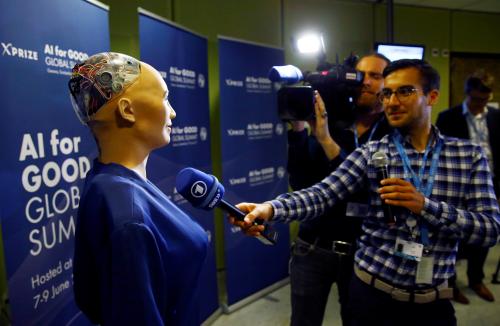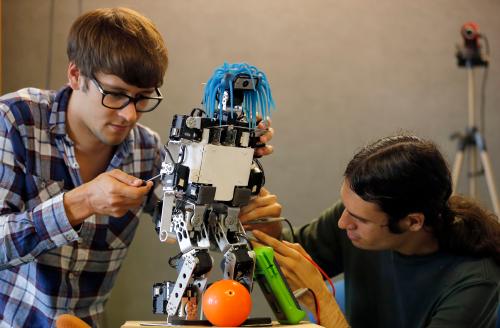The advent of the internet has opened a new space for creative work arrangements that challenge the time-honored distinction between labor and leisure. In fact, we now work all day, every day. When tagging an old friend in a picture of her most recent birthday, when asking Alexa to skip the next song, and when writing a review for the barbershop you went to yesterday, you are generating data that tech companies crunch along with millions of other user experiences, to profit from what their algorithms learn. But is a two-way in-kind transfer, in which technology users often get free services and tech companies get their data, the best arrangement possible? In a recent paper, we argue that perhaps it is not.
Many fear that Artificial Intelligence (AI) will end up replacing humans in employment – which could have huge consequences for the share of national income going to these displaced workers. In fact, companies in all sorts of industries are increasingly requiring less labor to do the same amount of work. How much work will end up being displaced by robots is still unknown, but as a society we should worry about what the future will look like when this happens. The paper’s main contribution is a proposal to treat data as labor, instead of capital owned by these tech firms. We think this might be a way to provide income and a new source of meaning to people’s lives in a world where many traditional occupations no longer exist. One of us, Jaron Lanier, posited this idea in a 2013 book entitled Who Owns the Future?.
An article in The Economist described data as the new oil fueling the current technological revolution. This makes the missing market for data all the more important, and potentially troubling. In the forthcoming book Radical Markets, another of us (Glen Weyl) argues that missing markets can preclude society from achieving efficient outcomes, increase inequality, and amplify other social problems. In a sense, data is being treated as free land for tech companies to discover and sweep up from our online footprints. This leaves users, in the absence of any bargaining power, destitute of a way to meaningfully negotiate over payments for their data and completely unprotected from the invasion to their privacy. This way, each of us are being denied a share in the economic value of the production our data empowers.
We argue that thinking of data as labor rather than capital is much more than just quibbling over words, a distinction without a difference. It matters how we as a society think and talk about user-generated data as an input to production, such as treating labor differently than capital. There is a certain sense of respectability and meaning that comes from our labor, and workers respond to incentives to work harder and produce higher quality goods and services. We argue that treating returns to data as returns to capital not only exacerbates inequality, but limits the productivity gains from the AI revolution.
But if the current world is such an inefficient arrangement, how did we end up here? Our paper contends that our current order comes from a combination of path dependence and entrenched interests that have most agents in the economy as potential losers if they were to individually deviate from the status quo. Two decades ago, the internet was an uncharted territory with vast potential. Its creators, dreaming of an achievable utopia, envisioned the internet as a venue for the free exchange of information and ideas. This allowed the formation of what Jaron Lanier calls siren servers, entities which figured out how to profit from this “free” environment and scale up to unforeseeable magnitudes. These siren servers, owing to the enormous “network effects” at play in information technology that favor incumbents, are what economists call monopsony buyers of data: inverted monopolies where few buyers possess most of the market power. Just as it is profitable for a seller with monopoly power to keep prices high and sell less, a monopsony buyer of an input will keep input prices low and buy less of it. While the resulting outcome is socially inefficient, consumers of data (the siren servers) generate profits from the lack of competition for data-suppliers (us users of their services). We discuss in the paper evidence of this effect, estimated both by us using data from within Microsoft, and in a related context by our colleagues Arindrajit Dube, Jeff Jacobs, Suresh Naidu, and Siddharth Suri.
The paper finishes by discussing necessary elements for a transition towards a “data as labor” world. To make this happen, large scale social institutions would need sources of countervailing power. The first and most natural balancing factor is competition, which by itself may prove to be insufficient because of the aforementioned economies of scale at play in this market. Thus, competition may need to come accompanied with the user’s ability to collectively bargain with tech companies over payments for their contributions. “Data labor unions” can work both as a force to credibly call a powerful strike as well as to certify data quality. Moreover, there is room for improvement of existing regulations. On one hand, we need regulatory frameworks that shift ownership rights of data to users and that consider how a ‘minimum data wage’ would work when we actually enjoy this kind of `work’. On the other hand, industry leaders need to realize that paying people for their data could actually fuel growth and promote long-term stability.
At 5 pages long, the paper does not expose all the details and complications that a Data as Labor economy would involve. Many of these receive a more thorough explanation in Weyl’s forthcoming book, and we are exploring others with our colleagues at Microsoft Research and in academia. Most importantly however, our goal is to be proactive shaping a future in which AI will play a significant role in the economy and in our daily lives. We call on researchers from all fields to join us in thinking critically about data as labor, and the future of the economy.
Microsoft is a donor to the Brookings Institution. The findings, interpretations, and conclusions posted in this piece are solely those of the authors and not influenced by any donation.
The Brookings Institution is committed to quality, independence, and impact.
We are supported by a diverse array of funders. In line with our values and policies, each Brookings publication represents the sole views of its author(s).











Commentary
Should we treat data as labor? Let’s open up the discussion
February 21, 2018